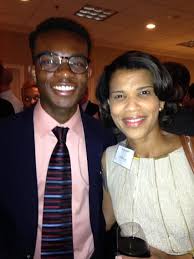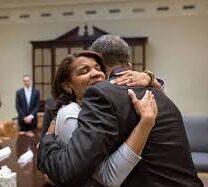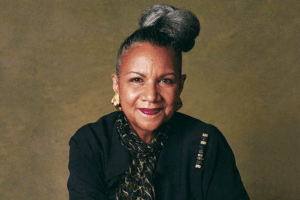By Tracy Chiles McGhee
As millions lined up at polling stations to cast their votes to elect the first Black president of the United States, criminal justice activist, Kemba Smith Pradia, stood on the sidelines, unable to participate in the historic election dedicated to hope and change.
When Smith’s 12-year old son, excited and curious, asked her who she planned to vote for, she explained with a heavy heart that her right to vote had been stripped away years earlier.
At 22, Smith gave birth to her son Armani a few months after her 1994 incarceration. Her case ignited outrage from supporters who believed the punishment was excessive given Smith’s status as a first-time, nonviolent offender and a victim of domestic violence inflicted by her boyfriend, the criminal mastermind central to the federal conspiracy charges.
 Kemba Smith and her son Armani
Kemba Smith and her son Armani
Convicted for her proximity to a drug kingpin, Smith, then a student at Hampton University, was sentenced to twenty-four and a half years in prison. She became a symbol of the devastating impact of the “war on drugs,” spurred by mandatory minimum sentencing under federal guidelines of the 1990s. The policy aggressively targeted Black defendants, visiting a new and profound impact on Black women and their families.
Kemba Smith’s story did not end with the slamming of prison doors. She was released in 2000 through clemency by President Bill Clinton, thanks to relentless advocacy of national organizations led by the NAACP Legal Defense Fund. Smith emerged not just as a survivor, but as a passionate voice for those silenced by the criminal justice system, especially Black women, often the most erased from justice.
Smith was freed from the shackles of federal prison but there were still obstacles, and stigma, a narrative she had to rewrite despite the support and resources afforded her by family and others during her reentry journey.
“I had to remind myself that I’m more than just a ‘formerly incarcerated person.’ I’m a mother, a daughter, a wife, and I refuse to let society define me by my past.”
Even as Smith navigated life by finishing her education (including obtaining a law degree) and beginning a career in leadership roles, she still couldn’t exercise one of the most crucial freedoms that democracy holds: the right to vote.
“It was inhumane for me to have to explain to my son how I couldn’t vote, while everyone else was proudly wearing their ‘I Voted’ stickers. I couldn’t shake the feeling that I was regarded as less than every other citizen in this country despite having served my time. I was a homeowner, paying taxes, raising a son, and contributing to my community. Yet, our country didn’t consider me worthy to cast my vote to address the issues that mattered most to me.”
Restoring voting rights for formerly incarcerated individuals varies widely from state to state. In one of the most restrictive states, Virginia, where Smith was a resident, defendants convicted of a felony can only have their voting rights restored through an individual petition to the Governor. This process often involves a lengthy waiting period, leaving many formerly incarcerated people stripped of their rights long after they have served their time.
Smith determined that even if she couldn’t vote herself, she would still help to get out the vote, working with organizations committed to empowering youth and the Black community.
“We need to bring human stories to young people, so they realize just how much who they elect impacts our communities. Nor can we just go to the same places to get people to vote; we need to reach every corner of our cities.”
Smith even acted as a delegate on behalf of the NAACP, speaking before high officials at the United Nations in Geneva, Switzerland about felony disenfranchisement laws in the US.
Eventually Smith’s voting rights were restored in 2012 and although she was elated, she remained committed to voting rights restoration. In 2019, her strong advocacy won her a gubernatorial appointment to the Virginia Parole Board where she served over two years.
And then came good news. In 2021, Governor Northam restored voting rights to over 69,000 Virginians with felony convictions through automatic restoration. However, progress was later halted when in 2023, Governor Youngkin reversed this policy, again requiring individuals to apply to regain their voting rights upon release from prison. This was a blow for those advocating for voting rights of the most disenfranchised communities.
Now 53, Smith’s commitment to criminal justice reform and voter engagement is forever rooted in her personal experiences.
 Kemba Smith and her family after voting in 2017
Kemba Smith and her family after voting in 2017
“I was driven to gain redemption for the choices I made, and I knew I needed to be a face and a voice for those I left behind in prison.”
Through her memoir, Poster Child: The Kemba Smith Story published in 2013, and the film she executive produced, Kemba, released in 2024 by BET+, she shares her harrowing journey through the criminal justice system and also highlights the broader issues of mass incarceration and felony disenfranchisement.
Beyond her storytelling, Kemba takes direct action to ensure marginalized voices are heard. She co-founded the Kemba Smith foundation with the mission of educating the public about drug policy and how easily individuals can become entangled in the system.
As we approach yet another historical presidential election, Kemba seeks to galvanize individuals to —register and vote, educate others, and advocate for the rights of the disenfranchised no less deserving of a voice in our democracy than any citizen.
Tracy Chiles McGhee is a Writer and Constituency Engagement Advisor for Unerased | Black Women Speak.
Join Kemba Smith and Unerased Black Women Speak for a screening of the film “Kemba” and a talk back. Click for event details.




